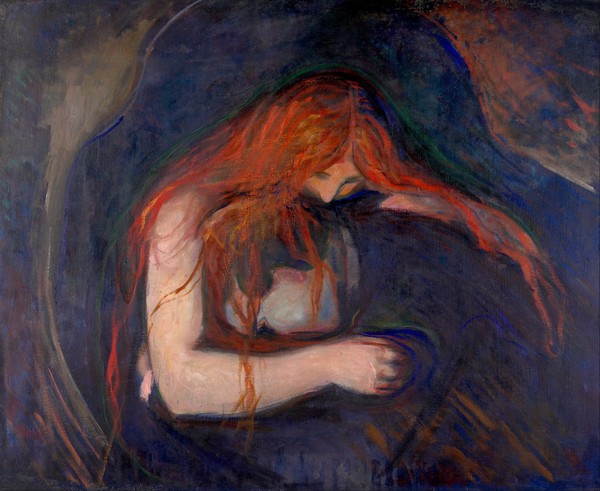
When a composer dedicates a work to a recently deceased composer, it's a sign of sorrow, respect and affection. If he dedicates it to the memory of a composer who died seventy years or two centuries ago, it will be a delicacy that speaks above all about admiration and gratitude. But if the composer does not use the most common formulas, “remembering” or “in memoriam”, but instead uses one usual in ancient Rome, “to the manes of”, then I have to pay especial attention to it.
In ancient Rome, the manes were the souls of the deceased loved ones, beneficent spirits honoured by their families; the funerary stelae were often inscribed with the formula “to the manes of my beloved son”, (or of the father, or of the relative to whom it was dedicated). In 1898, months after Brahms's death, Max Reger dedicated the Sechs Klavierstücke, Op. 24 “den Manen J. Brahms”; earlier, in 1895, he had dedicated Opus 16, his first organ suite, “den Manen J. S. Bachs”, and in 1893 he dedicated his first major collection of lieder, Opus 10, “to the manes of F. Schubert”. As far as I have seen, this expression was used occasionally at the time; I find it very nice from Reger to address the composers who had preceded it and inspired it as his beneficent spirits.
Bach, on the one hand, Beethoven, Schubert and Brahms, on the other, were composers who greatly influenced Reger's work. However, we still lack a third pillar of these influences: Liszt and Wagner. Two weeks ago, I talked to you about Reger's admiration for Wolf, following this line (he also dedicated to him a collection of Lieder, the Opus 51, in 1901, when he was still alive). Reger used to say that he had no interest in attaching to any musical current; he could draw from Bach's counterpoint, Beethoven's classical forms, and Wagner's chromaticism without this creating him a conflict of loyalty. Imagine, however, what it must have been like in the late 19th century in Germany to admire the music of Brahms and the music of Wolf equally (and publicly). Today, it's easy, but back then, it was at least confusing.
The musical work of Max Reger, the Bavarian composer born on 19 March 1873 (last Sunday marked 150 years) and died on 11 May 1916, also caused confusion among his contemporaries. There was no unanimity, not even a quorum, among the critics; perhaps precisely because they could not relate it to any particular aesthetic current. An organist (he already played at St. Michael's Church in Weiden at his thirteen), a pedagogue and a composer of a considerable large work, which covers all genres except opera, we now have practically forgotten it; let's hope that the 150 anniversary will help to correct it!
Regarding the Lied genre, Reger cultivated it all his life. He wrote about three hundred Lieder, published in twenty-eight collections, from Opus 4, which he composed at the age of eighteen, to Opus 142, which he wrote at the age of forty-two, a year before his death. From this extensive work, I suggest that we listen to one of the early songs, Trost [Consolation]
Between August and September 1894, Max Reger composed ten songs that were published in January of the following year as Opus 15, along with a collection of duets, the Opus 14. His publisher was then Augener&Co, in London. Opus 15 was not dedicated to any composer, but to a very close person: “gewidmet: "Dir””. And this dir, this you, was Mathilde Hilf, his fiancée at the time.
The ten songs of Opus 15 do not form a cycle; in fact, Reger did not write any song cycle. The ten poems are by nine different poets; one of them, unknown. The rest, except Joseph von Eichendorff, are barely known to Lied lovers. The poem of the last song, Trost, is by Gustav Falke, a name that you could remember as the poet of Karl Wiegl's Lied Seele, that we listened to some months ago. Falke, who was born in 1853 and died in 1916 (the same year as Reger), was a musician who taught piano for years. He started to publish his literary works in the last decade of the 19th century.Trost wasn't published until 1901, in Vermischte Gedichte, the second part of Mymheer der Tod, so Reger must have read the poem in some literary magazine.
The composer wrote with this short poem a song I like very much, contemplative and restrained. I mentioned at the beginning of the article the influences of Reger; if I had to find them in this Lied, I would say it has something from Schubert and also something from Wolf. Is that possible? Well, Schubert often revealed himself to be an advance to his time.
I hope you enjoy Trost (performed by Dietrich Fischer-Dieskau and Günther Weißenborn) and add Max Reger to the list of composers worthy of your time.
Still, still -
's ist nur ein Traum.
's geht alles vorbei,
Was es auch sei.
Spürest es kaum.
's ist nur ein Hauch,
Wie du auch.
Quiet!
it is only a dream,
for everything passes,
whatever it may be.
You will hardly feel it,
it will only be a breath,
just as you are.
(translation by Emily Ezust)


















Comments powered by CComment